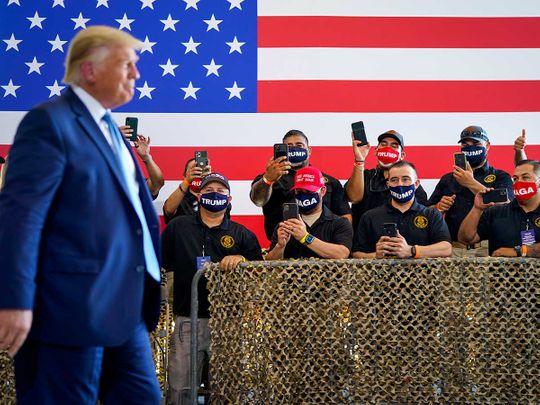
The opening day of the Republican National Convention was sleepy. Low energy. And sad.
This American ritual, during which each state pledges its delegates to the winning candidate, was bereft of charm. It was technically stultifying.
It was also devoid of Black people and sorely lacking in people of colour. And it was a long way from exemplifying gender parity. In essence, it was White men in a room simplifying complex issues and repeatedly pledging their fealty to guns.
It was Trumpian politics as television. And it was dismal.
Trump talked on and on. He’d leave a topic only to circle back to it. He’d begin to wrap up with a declaration of thanks and then he’d think of something else he wanted to say
Each state’s chairman or representative appeared in front of the same bland backdrop decorated with the hashtag #RNC2020. The camera’s framing trapped each speaker in an uninspiring rectangle.
The only reminder that the Republicans were live from a Charlotte ballroom were the disembodied cheers that would periodically erupt in the background — perfunctory, desperate noise from a greatly reduced throng.
Uncomfortably intimate
The view of each speaker’s face was so uncomfortably intimate that you could see the perspiration shining on one forehead after another. You could tell how close people shave and how diligently they floss.
And frankly, it just seemed to be a cruel and unnecessary act to put these civics die-hards under such a high-definition microscope.
But then, the longer the roll call ticked on, the more you realised that the Republicans had no interest in putting a gloss on their proceedings. They were revelling in the sweaty urgency of their law-and-order, build-a-wall, liberty-and-justice-for-me message.
More on US elections 2020
Diversity was mostly represented by American Samoa, Guam and Puerto Rico. The sweeping Whiteness of the roll call didn’t seem to weigh on anyone’s shoulders.
The fact that speakers had to reach back into history — to Frederick Douglass and Abraham Lincoln — to give the current party a sense of expansiveness and racial sensitivity did not give any of the speakers pause.
How heartbreaking that this major political party made no attempt to exemplify the everyone-is-created-equal ethos that its members so happily utter. There was no gathering up of disparate souls.
No openhanded symbol of fellowship that encourages wanderers to come as they are. The result was the sense that equality is something that the Republicans deign to give others if they are deemed God-fearing and baseball-loving enough.
Their party is not a big tent with flaps billowing open in the breeze. Theirs is a clubhouse with a locked door that they are trying to build a wall around.
The Democrats had taken their roll call on the road. Representatives stood in their home state surrounded by family, colleagues or a panoply of quirky citizens to make their declarations. The result was a homey and expansive view of America — from the majesty of the Black Hills to the calamari of Rhode Island.
Many of these postcards were pretaped, but viewers could see their neighbours in full. They could see the diverse geography of the country, whether it was a cattle ranch in the Western Plains or the fragile beaches of California, and get a glimpse of how that comes to define our thinking on so many issues.
A collection of talking heads
The Republicans depicted themselves as a collection of talking heads clustered behind closed doors. Instead of continuing to describe the extensive natural landmarks of Arizona, its delegation chairman extolled the “miles and miles and miles of big beautiful wall.”
Montana made note of there being almost five guns in every home. In the midst of the roll call, when delegates officially made the president the party’s nominee, the man himself strolled into the ballroom. (He was not wearing a mask; but then, you probably already knew that.)
He settled in behind the lectern and began to riff. He complained about the cable networks and how they weren’t showing the roll call live or that pundits were talking over it. He talked about absentee voting and mail-in voting and warned his supporters that the Democrats are “trying to steal the election from the Republicans.”
It’s a statement that says to his faithful that the victory already belongs to them, in the same way that President Donald Trump has reinforced their belief that the suburbs belong to them and the country belongs to them and God belongs to them, too.
Trump talked on and on. He’d leave a topic only to circle back to it. He’d begin to wrap up with a declaration of thanks and then he’d think of something else he wanted to say.
He kept going until you wondered what will he have left to talk about when he formally accepts the nomination Thursday evening. But of course, the content, the details, the logic don’t particularly matter to those shielded by his presence.
Trump is their neighbourhood watchman, rattling all the doors to make sure they’re firmly shut.
Robin Givhan is a noted editor and Pulitzer Prize winning writer
Washington Post







